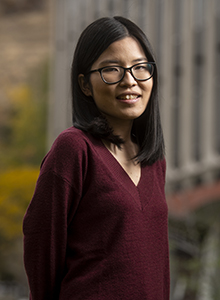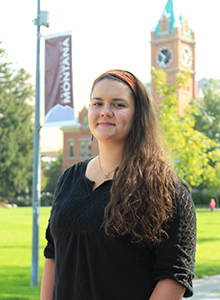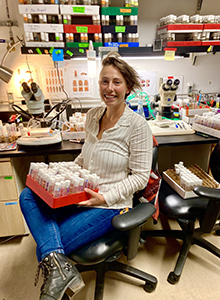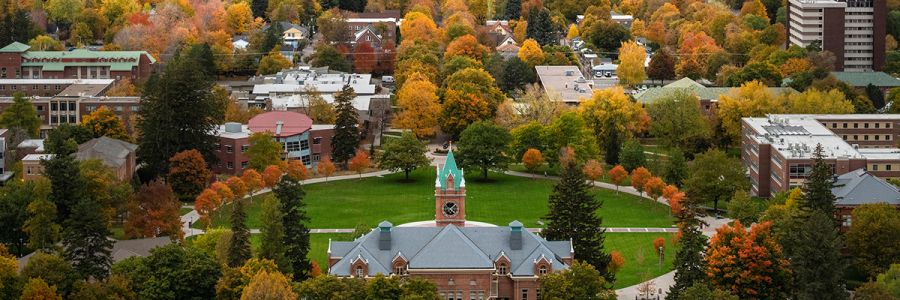'A Breath of Fresh Air'
Stella Duncan Memorial Fellows Pursue Impactful Careers in Biomedical Science
January 26, 2022
Miyuki Hayashi, Jess Ray and Jill Farnsworth have all dedicated their professional lives to improving the health of others — from battling viruses, to preventing lung disease, to promoting healthy aging. These accomplished University of Montana graduates have something else in common too: They each exemplify the legacy of scientific discovery and community service established by 1907 alumna and donor Stella Duncan Johnstone.
A Legacy of Learning and Service
Johnstone, of Glendive, was a successful entrepreneur who started her own fashion import business. Having experienced health complications from bronchial asthma during her lifetime, she made a commitment in her estate plan that endowed the Stella Duncan Memorial Fellowship to support health care-related research at UM. Thanks to that endowment, while she passed away in 1948 her legacy has supported a variety of innovative health care work efforts at UM and will continue to do so far into the future.
In the 1960s, research supported by the fund led to a breakthrough in the development of an effective tuberculosis vaccine. From 1985 to 2015, the fund supported world-renowned microbiologist Dr. Barbara Wright’s role as director of the Stella Duncan Memorial Research Institute. Prior to her position at UM, Dr. Wright served as an associate professor of microbiology and molecular genetics at Harvard Medical School. Through her formidable career, she published hundreds of research papers and was frequently asked to lecture.
Now, this prestigious award provides renewable stipends for brilliant doctoral students to study biomedical sciences and conduct research at UM. Below, three alumnae share how the fellowship supported their academic achievements and inspired them to build careers of impact.
Miyuki Hayashi '21

Miyuki Hayashi, from Sapporo, Japan, received the fellowship in 2020 and graduated with a Ph.D. in biochemistry and biophysics from UM in December 2021. Hayashi decided to pursue her graduate studies after earning a bachelor’s in biochemistry at UM in 2017 and being impressed by the supportive staff, including her Ph.D. advisor and Biochemistry Program Director, Dr. Stephen Lodmell.
Hayashi said the Stella Duncan Memorial Fellowship allowed her to focus on her research assistantship and on developing an antiviral strategy to combat Rift Valley Fever virus, which can cause severe disease in both animals and humans.
“I spent up to 70 hours in the lab each week,” she said. “With this support, I was more productive and able to concentrate on my classes, lab work for my dissertation and tutoring undergraduate students.”
In early 2022, Hayashi will begin a post-doctoral academic position at Thomas Jefferson University in Philadelphia. She will research neurodegenerative disorders, including Lou Gehrig’s disease and Alzheimer’s disease.
“I feel honored and encouraged to continue my research,” she said. “It’s a precious opportunity to earn prestigious fellowships. My husband and I were both helped by UM scholarships, and we would like to do the same for students one day.”
Jess Ray '21

Jess Ray, from East Lansing, Mich., also graduated from UM in December 2021. Ray chose to earn a Ph.D. in toxicology from UM after attending an undergraduate research program here.
Ray used her fellowship support to study under Dr. Andrij Holian, director of UM’s Center for Environmental Health Science, and examine why many lung diseases are more common and severe in women. Her research is innovative because the field of nano-toxicology is relatively new, and until 2016, the study of sex as a biological variable was limited.
As a teaching assistant, Ray spent up to 60 hours each week in the lab, but she still found time to serve her fellow students through UM’s Graduate and Professional Student Association, first as a senator, then as an executive member. She was also involved in the international Society of Toxicology and attended professional conferences around the country.
“This support changes lives,” she said. “I’m grateful to have received an award that will give me a competitive advantage as I advance my career.”
Ray is seeking an academic, government or industry profession where she can continue researching how biological sex impacts disease development.
Jill Farnsworth '19
 Jill Farnsworth, from Champaign, Ill., earned a Ph.D. in neuroscience with a specialization in neuropharmacology from UM in 2019. Like Ray, she also served on the Graduate and Professional Student Association. Farnsworth studied aspects of the cellular and molecular underpinnings that contribute to learning and memory mechanisms in Dr. Kasper Hansen and Dr. Michael Kavanaugh’s labs. Specifically, her dissertation research focused on alleviating certain forms of childhood epilepsy aphasia disorder, which is characterized by recurring seizures and impaired language skills.
Jill Farnsworth, from Champaign, Ill., earned a Ph.D. in neuroscience with a specialization in neuropharmacology from UM in 2019. Like Ray, she also served on the Graduate and Professional Student Association. Farnsworth studied aspects of the cellular and molecular underpinnings that contribute to learning and memory mechanisms in Dr. Kasper Hansen and Dr. Michael Kavanaugh’s labs. Specifically, her dissertation research focused on alleviating certain forms of childhood epilepsy aphasia disorder, which is characterized by recurring seizures and impaired language skills.
Farnsworth said the fellowship gave her time and flexibility to develop new lines of research, such as studying the transition between childhood and adolescence when many epilepsy aphasia spectrum disorders occur. Because she did not have to seek a teaching or research assistantship to support herself during school, she was able to complete these intensive experiments, some of which lasted up to one month.
“It was a breath of fresh air not to worry about working and finances while attending school,” she said.
Farnsworth appreciates that the fellowship allowed her to try innovative methods and made her a more versatile scientist.
“This award was a ticket to my own creative scientific freedom,” she said. "When I applied for post-doctoral jobs, I didn’t feel like I had to stay in the same field because I had the experience and resources to expand into different areas.”
In addition to providing financial stability, time and creative freedom, the fellowship validated Farnsworth’s academic achievements.
“Especially for women in science, getting any recognition for our hard work that isn’t related to traditionally gendered traits is so valuable,” she said. “This award gave me the confidence and encouragement to follow my passion.”
Now, Farnsworth conducts research at the Buck Institute in Novato, Calif. Her work provides insights about the importance of maintaining an active lifestyle to promote healthy aging.
Learn More
To learn more and make a gift to the UM Foundation in support of health care science or graduate students, contact Kate Jennings, vice president of development, at kate.jennings@supportum.org or 406-243-4607.
